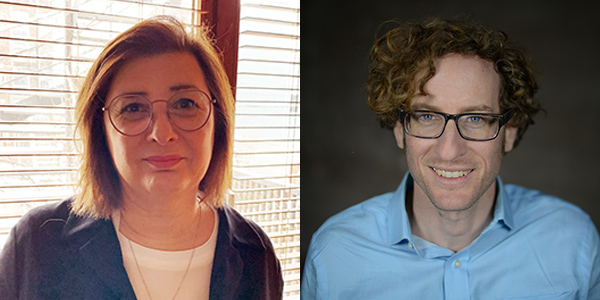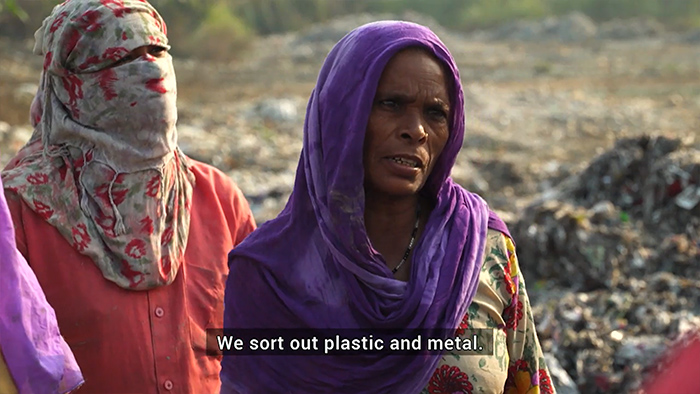2023 Honourable Mention

Gil Shochat, producer
Chantal Lavigne, national reporter
Jean-Pierre Gandin, cameraman
Jean-Yves Houle, editor
Benoit Michaud, researcher in Montreal
Mrigakshi Shukla, producer/fixer in India
Manoj Pal, researcher/fixer in India

Before 2018, most of Canada’s recycled waste was exported to China. That year however, Chinese authorities, tired of being the west’s dumping ground, banned the import of most solid waste. With only a small fraction of Canada’s plastic waste recycled here in Canada, Shochat and Lavigne began their year-long investigation into where all that hard-to-recycle plastic was now going.
To find out, they had to penetrate the opaque recyclable waste trade. They began with a tip from a Belgian environmental inspector who intercepted several containers of paper waste from four different sorting centres in Canada. The paper was headed to India for recycling, but the inspector discovered that the shipments were contaminated with almost 25% plastic, far exceeding the legal limit for export. The containers were sent back to Canada, and it was not the first time. As Lavigne and Shochat discovered, over 120 containers of recycling waste have been turned back in the last five years.
Next, they turned their attention to Ricova, one of the largest exporters of recycled paper from Quebec and Ontario, and which manages the Montreal sorting centre behind some of the contaminated shipments. They obtained Indian import-export data and traced Ricova’s shipments from Montreal to Muzaffarnagar, a north Indian city where about thirty paper mills are concentrated. What they discovered there was even more troubling.
In Muzaffarnagar, they found mounds of purported paper waste, destined for recycling or burning in nearby factories, strewn with plastic bags and packaging from Canada. With little local oversight, these plastic scraps are often burned, a process that releases dioxins and other toxic gasses into the air. Residents say this is causing elevated levels of asthma, respiratory illness, skin disease and cancer in the local population.
The journalists pressed Ricova for accountability. It denied responsibility. The city of Montreal said the problem was out of its jurisdiction. The federal environment minister admitted that the exportation of contaminated waste was a serious problem, and that it needed to stop.
And some progress has been made. Since Enquete’s report aired, the “Journal de Montréal” also looked into Ricova and revealed that the company has links to organized crime. The City of Montreal terminated its contract with Ricova for the management of one of its sorting centres. That sorting centre is now run by a well-regarded non-profit organization. Exporters have reported that the federal environment department has increased its inspections at the Port of Montreal, and Ricova recently announced a significant decrease, from 35% to 2%, of contaminants in its mixed paper in one of its other sorting centres.
Meanwhile, the Belgian inspector is still sending any contaminated bales he finds back to Canada.
Chantal Lavigne is an investigative journalist for CBC Radio-Canada’s program Enquête. She began her 30-year career with Radio-Canada as a news reporter for the radio and went on to work for the weekly current affairs national magazine “Dimanche Magazine.” That’s where she developed an interest for environmental and justice issues as well as international reporting. When the television weekly international program “Une heure sur terre” was created in 2006, she was hired as one of their full-time reporters. She has worked at Enquête since 2013. Her investigations range from the hidden story of a Canadian Ebola vaccine that was shelved for years before it was used, to the recruitment of young Canadian jihadists by ISIS and organ waste by the medical system in Canada.
Gil Shochat is an award-winning producer-director with the CBC Radio-Canada’s flagship investigative program Enquête. He began his journalism career as a researcher for investigative reporter Seymour Hersh and worked on topics including Iraq and WMDs as well as the Abu Ghraib torture scandal. In 2012, he produced an exposé on the Canadian asbestos industry which showed how, for decades, it funded questionable pro-industry science at McGill University. The piece was credited with helping prevent the reopening of an asbestos mine in Quebec. At Enquête, he produced stories on the Paradise Papers offshore tax leak, Imperial Oil’s connections to climate denial, and the Monsanto Papers.

